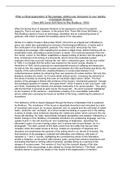Essay
Critical appreciation essay on unseen dystopian extract
- Institution
- OCR
Exemplar critical appreciation essay on an unseen extract from a dystopian text - contains references to Huxley's 'Brave New World' and valuable context - great example of how to tackle unseen essay questions - grade A
[Show more]



